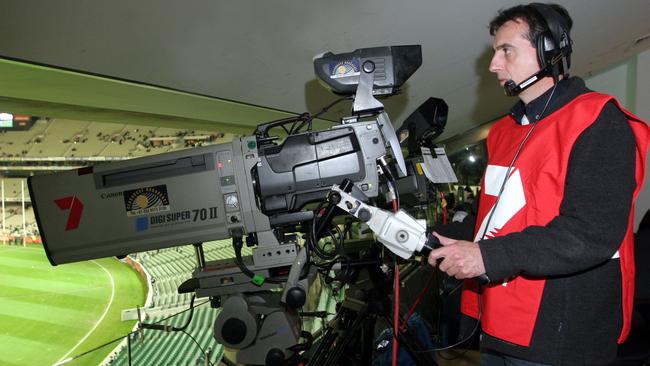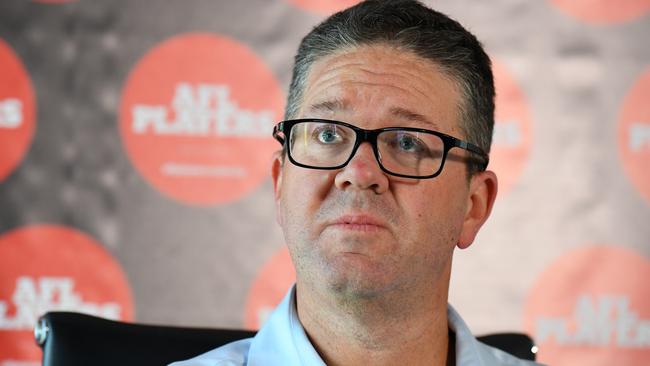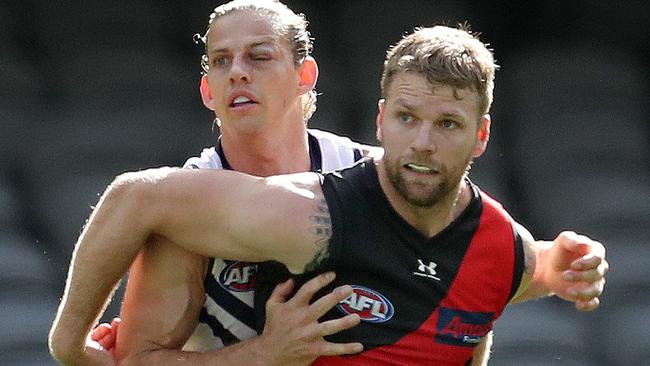Coronavirus crisis tipped to take big toll on next AFL broadcast rights deal
The AFL will have to take a cut on its broadcast rights deal for the first time in history. But could a new player like Amazon, Google or Facebook join Channel 7 and Foxtel at the bidding table?
AFL News
Don't miss out on the headlines from AFL News. Followed categories will be added to My News.
The value of the AFL’s prized TV rights is tipped to fall as the sports media industry reels from the coronavirus crisis.
Experts believe the prospect of a cashed-up new player such as Amazon, Google or Facebook emerging at the bidding table has diminished.
LISTEN TO THE HERALD SUN FOOTY PODCAST IN THE PLAYER BELOW
A more likely move is a two-year extension with current rights holders Channel 7 and Foxtel.
But AFL Media, the league’s in-house digital business, could be significantly downsized as a result of the negotiations and refocused on supporting club websites.
The current six-year, $2.56 billion AFL deal – averaging $418 million a season in cash and contra – expires at the end of 2022.
RMIT associate professor and sports marketing expert Dr Con Stavros said the league’s media rights growth had been “staggering” across the past two decades, but would almost certainly take a hit like most sports internationally in the post-COVID world.
“It would be hard to imagine it is not (going to take a hit),” Dr Stavros told the Herald Sun.
He wouldn’t put a figure on what the broadcast rights could drop to, but said a combination of issues would impact on negotiations, including the fact that the free-to-air networks were “not the money making machines they once were”.
Relive classic AFL matches from the 60s to today on KAYO SPORTS. New to Kayo? Get your 14-day free trial & start streaming instantly

He doubted global media powerhouses Google, Amazon or Facebook would be willing to be involved at a significant level as “they work to a different model”.
The AFL and its media partners are already talking about extending their deal for another two seasons to the end of 2024.
Dr Stavros said the league should try and finalise those details “sooner rather than later” to provide greater certainty for the game.
The financial tsunami will almost certainly see a renegotiation of the league’s collective bargaining agreement with the game’s 850 players.

MORE AFL:
AFL increasingly hopeful it could kick-start season with regular weekend fixture
Premiership Roo Corey McKernan says Dean Laidley’s lifestyle a test case for the AFL
AFL greatest team of the decade: You decide the best team since 2010
AFL players’ boss Paul Marsh confirmed the agreement between the players and the AFL – also due to expire at the end of 2022 – would be reviewed later this year.
But any new arrangement will require the AFL agreeing to “full” financial transparency.
“We have agreed, as part of the pay deal we did a few weeks ago, that we will review it,” Marsh said.
“Our starting point is we have a CBA that is in place but we understand that the industry is going through some pain.
“We need to get an understanding of the actual impact of COVID-19 on the industry to be able to work out what it looks like going forward.
“We are going to need some full transparency and then we’ll work through it with the AFL like we always do.”

CRUNCHING THE NUMBERS
Carnage:
Footy stands to lose about $300 million this year if the season is completed and up to $600 million if it is abandoned, driving the AFL’s desperation to get the show back up and running.
TV rights:
For the first time in the game’s history, the price of the game’s broadcast rights is expected to fall. The current six-year, $2.56 billion deal, is worth about $418 million a season – a figure experts predict cannot be matched in the post-COVID climate. Talk of a two-year extension for current rights holders Channel 7 and Foxtel is strong.
Sponsorships:
The AFL’s major partner, Virgin Australia, is on its knees. That deal is worth up to $10 million. Carlton, Gold Coast and Greater Western Sydney also have arrangements with Virgin. Clubs and head office will find it more difficult to attract – and retain – sponsors given the serious financial downturn.
Crowds:
Grand Final ticket sales alone generate more than $50 million in revenues. The loss of gate taking across the season will devastate the competition.
Club distributions:
Footy’s richest clubs including Richmond, West Coast, Hawthorn and Collingwood pocketed minimum AFL distributions of $11.5 million last season. The Gold Coast Suns received the most at $27.5 million. But all bets are off this year and beyond with distributions tipped to plummet.
Club debt:
Money paid over and above the base distribution from next year to clubs could be considered a loan. AFL chairman Richard Goyder has guaranteed the future of all 18 teams but clubs with big debts such as St Kilda and Brisbane will find the road ahead difficult, as will those clubs who rely heavily on gate takings.
AFL staff numbers:
Staffing numbers at AFL headquarters in the Docklands had soared beyond 400. Cash-strapped clubs will be watching closely whether staffing culls across the industry will be matched by a bloated head office.
AFL wages:
Total AFL staff wages topped a staggering $115.6 million last financial year. Australian Securities and Investments Commission documents reveal the league’s 12-person executive took home $10.56 million in combined wages alone, an average salary of $880,000. Gillon McLachlan’s salary is now a closely-guarded secret but was last publicly disclosed at $1.74 million three years ago. He has vowed to match the salary sacrifices made by the players this year but the full extent of league pay cuts is yet to be disclosed.
AFL Media:
The league’s contentious digital business employed more than 120 people at its peak but could be dismantled as part of negotiations over the TV rights.
Collective bargaining agreement:
The game’s 850 players struck a $1.8 billion, six-year deal several years ago, equating to 28 per cent of $6.574 billion in forecast revenues. The salary cap this year was agreed at $13.02 million, $13.28m next year and $13.54m in 2022 with the average player wage to hit $403,000. But the AFL wants to renegotiate the CBA, setting the scene for another ugly standoff with the players, who are demanding full financial transparency from the league’s top dogs.
Footy abroad:
The AFL claims its China arrangements – including a Shanghai office – are a “break even” exercise for the league and makes money for clubs, grassroots, development programs and AFLW. But the annual Port Adelaide-St Kilda clash is in grave doubt. Global jaunts are off for the immediate future, and maybe forever. The International Rules series in Ireland has been cancelled, while games touted for Los Angeles and India are off the table.
Expansion clubs:
The future of footy’s $250 million disaster club, the Gold Coast Suns, will come into sharp focus when the crisis clears. Fans won’t cop the demise of heartland Victorian clubs over the Sunshine strip white elephant. Its younger cousin, Greater Western Sydney, has earned its place in the competition but will require significant financial support for years to come. Dreams of a stand-alone Tasmanian team have been shelved.
Fixture:
Some industry figures have flagged the prospect of the AFL using its original 2020 fixture (now all but discarded) as the template for the 2021 fixture. It would save time and manpower but would also be fair and equitable for the clubs based on last year’s finishing order. Some administrators are pushing for a permanent 17-round season plus finals with a wildcard weekend added.
Pokies:
Clubs such as Hawthorn and Carlton who rely heavily on poker machines will suffer extra pain because of the lockdown of pubs and clubs.
State leagues:
The VFL (and former VFA) has been a victim of the march of the national competition. The AFL is being urged to guarantee its survival including safeguarding historic stand-alone clubs like Port Melbourne, Williamstown, Werribee, Coburg and Frankston.
